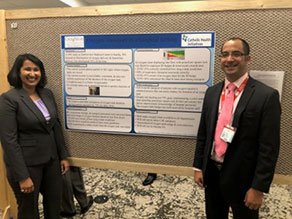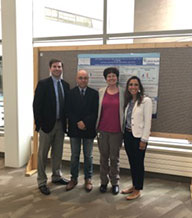Creighton’s Omaha Campus is closed Friday, Feb. 20, due to winter weather. All on-campus events, in-person classes, and clinics are canceled. All other classes and events will take place as normal.

Quality Improvement Projects
A Message from Dr. Andukuri

As physicians, we take an oath to “first do no harm”! So, safety should be innately built into everything we do. Increasingly, our patients expect us not only to provide safe care, but also to provide effective and high- value care with better access. Given the current national debate on how to do all the above, we as a healthcare system and professionals need to further educate ourselves on improving the healthcare for the population we serve and their needs in a cogent way.
Accreditation Council of Graduate Medical Education (ACGME) and Clinical Learning Environment Review (CLER) are requiring residency programs to integrate quality into their curriculum to develop future physicians who would apply these principles in their practice thereby providing high quality and high value care. Creighton residents and fellows have integrated these concepts into their daily work. Over the last three years, the number of QI projects per year has increased from 114 projects, with the potential to save the hospital system $8 million a year.
At Creighton University based on our Jesuit values and the outstanding support and direction from GME and the department of Internal Medicine we started a journey with the following goals:
- To teach the key principles of patient safety, systems thinking and quality improvement (QI) principles & methodology to all our trainees
- To develop a culture of safety, quality and teamwork which will help our trainees to carry the skills onto their careers
- To prepare physicians in training to be stewards of safe, high quality, high value, and patient centered care
- To develop future leaders in quality and safety and healthcare innovation
Towards this journey, in the last several months, we have started integrating quality and safety into our curriculum. The initial steps were to develop a structure and provide residents with resources for both data and QI experts. In the meanwhile, we started with didactics and encouraging QI projects for all residents. Furthermore, we also started to incorporate self-paced Institute for Healthcare Improvement (IHI) learning modules and started to incorporate residents into hospital safety, quality and CHI Living Our Mission (LOM) committees. There has been ongoing support for all the QI projects, their implementation and methodology. Our educational curriculum is also being expanded to include a separate curriculum for High-Value care in addition to patient safety and quality improvement.
Annual Quality Improvement Symposium


The Quality Improvement Symposium rounded off the week and showcased the hard work and collective efforts to improve patient safety and quality of care within the hospital system. All of the projects had a significant impact on the work environment of the hospital and, most importantly, the patients we serve.
During the week, the Graduate Medical Education Office and Administration, in conjunction with CHI Health and the Creighton School of Medicine, collaborated to produce the first Multidisciplinary Panel to review potential resident-created quality improvement projects. The panel, which included representation from the hospital administration and quality departments, School of Medicine research and biostatistics experts and system quality leaders and data analysts, reviewed potential QI projects and provided feedback. This will be the model going forward to facilitate integration of the quality improvement process throughout the Graduate Medical Education programs.
QI Awards
Alignment with Hospital Quality Initiatives
Dr. Michael Klug, Internal Medicine Resident, project, Code Sepsis: We’re on the Clock
Alignment with the Mission of Creighton University
Dr. Nikhil Jagan, Pulmonary-Critical CareFellow, project, Code Blue Training: A Multidisciplinary Approach
Evidence Based Guidelines
Johannes O’Neill, Colon Rectal Research Fellow, Standardizing Colorectal Adenoma with Invasive Adenocarcinoma Staging
Reduction of Health Disparities
Dr. Keidren Lewi, Family Medicine Resident, project, Improving Healthcare through Addressing Food Insecurity
High Value Care
Dr. Thamer Kassim, Internal Medicine Resident, project, Decreasing Inappropriate C. Difficle Testing
Best Overall Idea
Dr. Keidren Lewi, Family Medicine Resident, project, Improving Healthcare through Addressing Food Insecurity
Best Overall Poster
Dr. Jeff Macaraeg, Pulmonary-Critical Care Fellow, poster, Standardization of Post Code Debriefing
Best Overall Quality Initiative of the Year
Dr. Michael Klug, Internal Medicine Resident, project, Code Sepsis: We’re on the Clock


